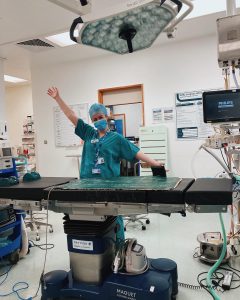A Day in the Life of a Dietitian
Jess is now a qualified dietitian working in a London hospital. In this article, she talks about the role of a dietitian, and her work during a 5-month training placement as part of her 2 years Masters’ degree at Kings College, London.

[Disclaimer: At the time of writing, I was a student, and therefore not a qualified dietitian, so was under the supervision of my supervisor. All patient information is general and non-specific. All dietary information and guidance was specifically tailored for the patient based on their unique nutritional needs, and should not be followed unless advised by your own healthcare professional].
What is a dietitian?
There is so much out there these days in the sphere of health and wellbeing. And unfortunately, in this money-making industry, much of it is unsupported by any evidence, meaning that it probably won’t work, but we consumers are sucked into believing that it will. Empty promises such as “fat-free” “lose 3 stone in 2 weeks” “keto is the best” are everywhere, often detrimental to our health, as well as our wallets! This is where dietitians come in to save the day!
So, what exactly is a dietitian? A Registered Dietitian (RD) is a qualified and regulated healthcare professional that assesses, diagnoses, and treats dietary and nutritional problems at an individual level, within hospitals, community care, or the wider population public health level (i.e., healthcare interventions).
Simply put, a dietitian converts the science of nutrition into individually tailored patient care. It usually takes a long time for an individual to become a dietitian, and it is incredibly competitive. A dietitian is very different from a nutritionist or any other health career, as it is the only nutrition healthcare profession that is accredited – meaning you have to be registered under a healthcare council, and follow the science of nutrition. (They won’t be giving money-making opinions that have no medical basis – exactly what so many of us accidentally fall for!).
What is the day-to-day role like?
This represents typical days during my clinical placement experience. I worked both in the hospital environment and within the community.
Typical day in the clinical setting
8-9am: Arrive at work, eat breakfast at some point in the morning!
9-10am: Check patient caseload and emails.
10:30-12: Head up to the wards to see patients
12:30-1pm: Lunch
1:30- 3pm: Make any relevant changes, type up notes, call doctors, return to the wards if needed
3-4pm: Upload notes
4:30-5pm: Leave hospital
Dietitians can typically work 8am-4pm or 9am-5pm, Monday – Friday (yes, thankfully no weekend work at the moment, although this may change in the future…). This does mean that currently the hours are very social, which is a great perk of the job.
Each dietitian has their own caseload, which is their own list of patients whom they care for. On average (though this may vary by hospital), each dietitian can care for between 30-50 patients at one time. It sounds like a lot, and it certainly is, but unfortunately, that is a consequence of NHS funding issues.

Whilst I was on my placement, I spent time with senior health patients, including caring for people who had experienced bad falls and needed to receive nutrition via a feeding tube, or those who had dementia and would find difficulty in remembering to eat. I also worked in cardiology and renal, where patients have to be particularly careful with their fluid, potassium, and phosphate intake; the dietitian is key in helping to monitor levels. Other areas I worked in included paediatrics, neurology, oncology, respiratory, ICU and gastroenterology. Most hospital placements are structured like this in order to give the student a taste of different clinical areas where a dietitian is needed, to help them decide where they may like to specialise eventually. Personally, I particularly enjoyed renal and cardiology, because it felt very ‘medical’, and as a dietitian, you are an important part of the multi-disciplinary team.
Typical day in the community setting
8-9am: Get to work
9-11am: Run morning clinics
11:30-12: Write up notes
12:30-1pm: Lunch break
1-3pm: Afternoon clinics / home visits
3:30-4/5pm: Write up notes
Being a community dietitian is similar to a clinical dietitian in terms of your focus on care for the patient, but your days are very different. For example, as a community dietitian you run outpatient clinics. These may be offered to people who are on a weight maintenance programme, patients post-gastric bypass surgery, type 2 diabetes patients, or people looking to make behaviour changes in relation to their diet. You also visit some patients in their homes, such as residents of care homes, those with feeding tubes that need monitoring, and other special cases. This all involves evidence-based research advice. For me personally, it made me realise that I far preferred working in a clinical setting.
Dietitians work both within the NHS and may eventually run private clinics, working with both healthy and sick people in a variety of settings. They work as integral members of a medical team to treat complex clinical conditions such as diabetes, food allergies, eating disorders, malnutrition, and bowel disorders.
As mentioned above, the title of a dietitian is protected by law, and is the only food and nutrition professional in this bracket, meaning only those who are registered with the Health & Care Professions Council (HCPC) can use this title. Dietitians are governed by an ethical code, ensuring that they always work to the highest standard.
What qualifications do you need to become a dietitian?
The minimum requirement is a BSc Hons in Dietetics; or a related science degree with a postgraduate diploma or a higher degree in Dietetics.
Being a dietitian is fun, challenging and rewarding, and working in the NHS is even more so – it is full of extremely hardworking, intelligent people who truly enjoy caring for others, even in the face of difficult challenges!
More about careers:
Q&A: Women in STEM Careers – My Experience
